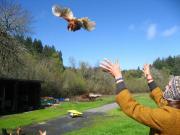Yesterday, Kasper and I picked up a bag of bio Mung Beans, which we are prepared to sprout. Mung beans are tridoshic, meaning that they can help to balance all 3 doshas (vata, pitta, kapha) in Ayurveda. They offer 14 gms of protein per cooked cup. Mung beans are also a good source of dietary fiber. They also contain thiamin, iron, magnesium, phosphorus, potassium and copper, and are a good source of folate.
Mung beans can be eaten on their own, or combined with rice to make khichari, or combined with vegetables and greens to make hearty soups or ground into flour to be used to make crepes or added to breads. Turmeric, cumin, dried ginger and coriander are some spices that work very well with mung beans.
They are popular in China and India, and their sprouts are often used in Chinese cuisine. You can sauté the sprouts for a minute or eat them raw.
The sprouts that you buy in stores are usually processed with gaseous chemicals, then sit around for a while... And I'm skeptical about their nutritive properties, so self-sprouting seems like an excellent alternative.
(self-sprouted beans from a friend's kitchen in southern france)

Comments
fan of sprouts
Mung beans are great. I tried them and sprouting other seeds and beans, like fenugreek seed, chickpeas.... I am a big fan of this healthy easy and slow food preparation